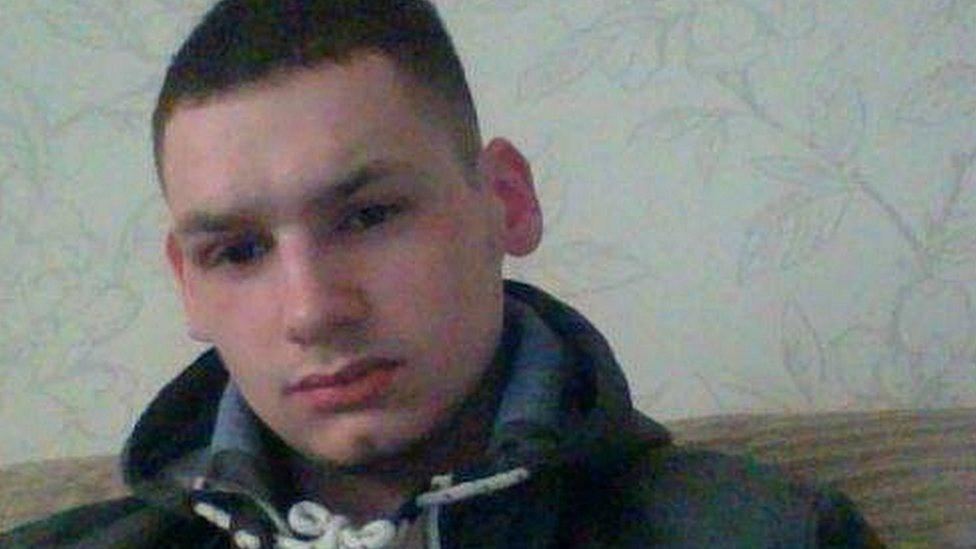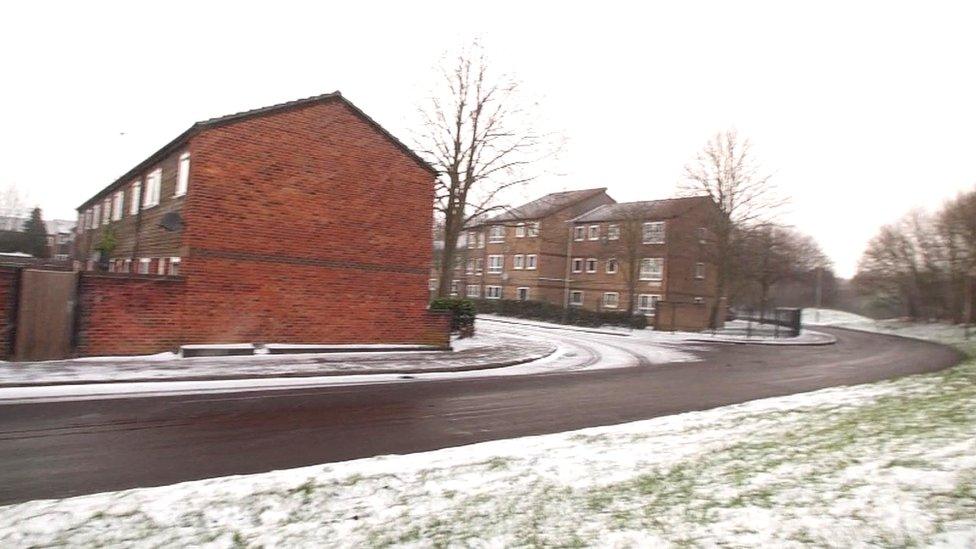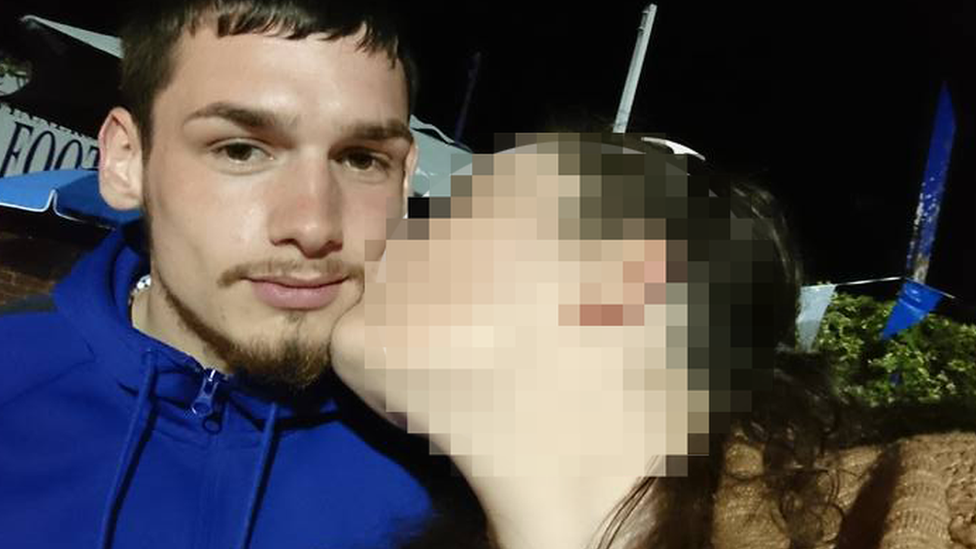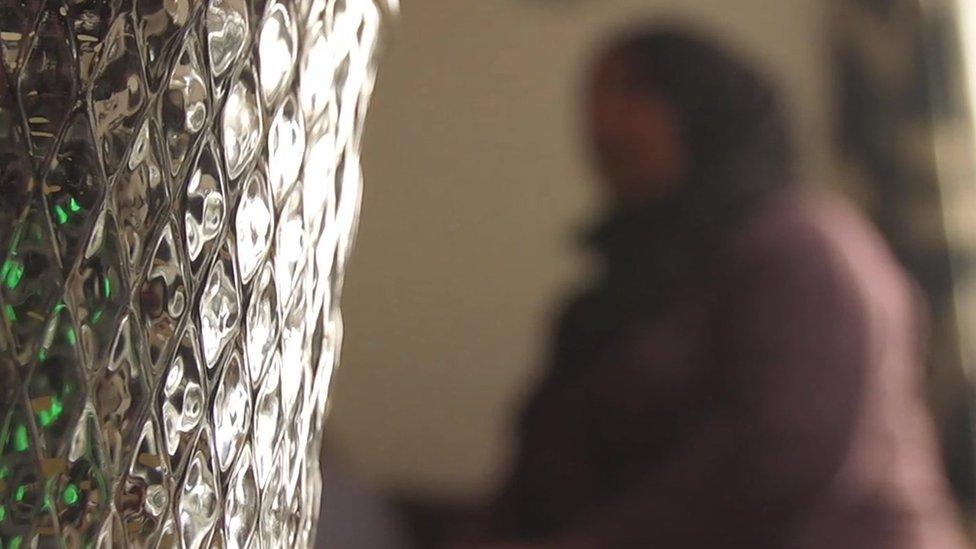Paul Moore guilty of Leicester hate crime car attack
- Published

Paul Moore entered no defence to the allegations
A man has been convicted of the attempted murder of a Somali woman after knocking her over in his car and then going back to run her over as she lay helpless on the ground.
Mother-of-nine Zaynab Hussein suffered life-changing injuries in the attack in Leicester last September.
Her life was saved after extensive specialist surgery but she remains confined to a bed.
Paul Moore, 21, from Leicester, was found guilty at Nottingham Crown Court.
Jurors also convicted him of the attempted grievous bodily harm of a 12-year-old Somali girl, for trying to drive into her minutes after the first attack.
Moore - who has previous convictions and was on bail for a charge of causing grievous bodily harm when he was arrested for the attack - looked straight ahead and showed no emotion as the verdicts were read out.
In the hours leading up to the attack, which happened five days after the Parsons Green attack in London, Moore had been drinking heavily with friends.

Scene of the attack: Zaynab Hussein hit the wall of this house, after Moore drove at her
Mrs Hussein was returning home after dropping off her two youngest children at school when she was knocked down.
She was thrown by the force of the impact into the wall of a house in the Beaumont Leys area of Leicester.
In two witness statements provided from her hospital bed, she said she could feel blood on her forehead and had lost sensation in her limbs, believing them to be broken.
She tried to reach her mobile phone to call family and was crying for help. Two drivers stopped to ask if she needed help, but then drove on.
Mrs Hussein was left with a fractured pelvis, spine and multiple other injuries including severe breaks to her limbs.
Two young men who had been in the car told police that Moore, who is unemployed, had told them he wanted to run someone over. After he first hit Mrs Hussein, sending her flying, the pair jumped out of the still-moving car.
Moore performed a U-turn to return to the scene. He drove past Mrs Hussein and seeing her on the ground, he turned the car around, mounted the pavement and drove over her with all four wheels.
He then drove off again and spotted a 12-year-old Somali girl, identified by him as a Muslim because of her headscarf, walking to school with her cousin. Moore drove at her, apparently mounting the pavement again, but this time he clipped her side, sending her bag flying. The girl was unharmed but shaken.
During the trial, the jury heard that after the attack Moore turned up severely drunk at the home of his half-brother, Lewis Welsh, and told him in offensive, racist terms, why he had attacked the woman.

Paul Moore in a picture taken weeks before his attack
"I don't think he knew what he was saying or doing. But he did tell me that he had ran over a 'Paki'," said Mr Welsh.
"He tried to put it down to the London 7/7 bombings. He said he was proud of himself. He was rambling. He was doing the country a favour."
Mrs Hussein remains in pain and is still receiving medical treatment for her injuries - including returning to hospital for more surgery.
She and her husband are too scared to talk publicly about what happened but the wider Muslim community in the Beaumont Leys area remains in shock.

Community in fear: Activists say Muslim women in Leicester are scared they too will be targeted
"Everyone has been talking about how this happened - and why," said Zuleika, a community activist in Leicester.
She, like all the others the BBC spoke to, asked to remain anonymous because they are scared there could be another attack.
"We are just asking ourselves who is going to be next. We have found out about other parents who have been insulted because they are Muslim. Some of them are scared and afraid to raise their voice - for every woman in this community, we now have the same fear."
Paul Moore pleaded denied attempted murder but gave the court no defence to the accusation that his crime was motivated by hate.
National statistics show that hate crime appears to have been rising over the last two years:
There were 80,393 offences in 2016-17 in England and Wales
That's up from 62,518 in 2015-16
The rise was the largest increase since the Home Office began recording the figures in 2011-12
Part of the rise was down to better reporting but police were also sure there were spikes after major moments of tension.
The most significant of these were the EU Referendum in June 2016 and the terrorism attacks at Westminster Bridge, Manchester Arena and London Bridge.
The Parsons Green London Underground attack came outside of the period for these statistics - but Moore's attempted murder of Mrs Hussein occurred five days later.
Azhar Qayum of Mend, a campaign organisation tackling Islamophobia, said women were particularly vulnerable to attacks, alongside elderly men, because they tended to be more visible.
"What's happened to Mrs Hussen is very serious - but it is not an isolated case," he said.
"There has been a long line of very serious crimes like this. We have had the Islamophobic murder of Mohammed Saleem in Birmingham, we have the Islamophobic murder of Mushin Ahmed in Rotherham, an 81-year-old grandfather.
"And we have had the attack last year on worshippers at Finsbury Park. Although this is very serious, this level of seriousness is not isolated."